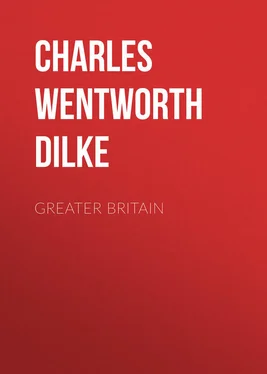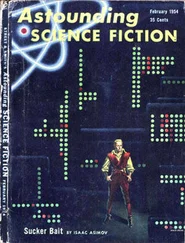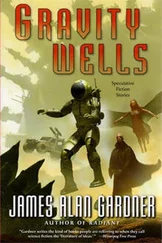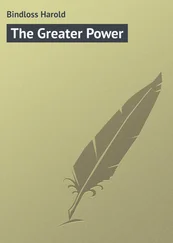Charles Dilke - Greater Britain
Здесь есть возможность читать онлайн «Charles Dilke - Greater Britain» — ознакомительный отрывок электронной книги совершенно бесплатно, а после прочтения отрывка купить полную версию. В некоторых случаях можно слушать аудио, скачать через торрент в формате fb2 и присутствует краткое содержание. Жанр: foreign_antique, foreign_prose, Путешествия и география, на английском языке. Описание произведения, (предисловие) а так же отзывы посетителей доступны на портале библиотеки ЛибКат.
- Название:Greater Britain
- Автор:
- Жанр:
- Год:неизвестен
- ISBN:нет данных
- Рейтинг книги:5 / 5. Голосов: 1
-
Избранное:Добавить в избранное
- Отзывы:
-
Ваша оценка:
- 100
- 1
- 2
- 3
- 4
- 5
Greater Britain: краткое содержание, описание и аннотация
Предлагаем к чтению аннотацию, описание, краткое содержание или предисловие (зависит от того, что написал сам автор книги «Greater Britain»). Если вы не нашли необходимую информацию о книге — напишите в комментариях, мы постараемся отыскать её.
Greater Britain — читать онлайн ознакомительный отрывок
Ниже представлен текст книги, разбитый по страницам. Система сохранения места последней прочитанной страницы, позволяет с удобством читать онлайн бесплатно книгу «Greater Britain», без необходимости каждый раз заново искать на чём Вы остановились. Поставьте закладку, и сможете в любой момент перейти на страницу, на которой закончили чтение.
Интервал:
Закладка:
There is no surer test of the condition of a country than the state of its highways. In driving on the main roads round Richmond, in visiting the scene of McClellan‘s great defeat on the Chickahominy at Mechanicsville and Malvern Hill, I myself, and an American gentleman who was with me, had to get out and lay the planks upon the bridges, and then sit upon them, to keep them down while the black coachman drove across. The best roads in Virginia are but ill kept “corduroys;” but, bad as are these, “plank roads” over which artillery have passed, knocking out every other plank, are worse by far; yet such is the main road from Richmond toward the west.
There is not only a scarcity of roads, but of railroads. A comparison of the railway system of Illinois and Indiana with the two lines of Kentucky or the one of Western Virginia or Louisiana, is a comparison of the South with the North, of slavery with freedom. Virginia shows already the decay of age, but is blasted by slavery rather than by war.
Passing through Petersburg, the streets of which were gay with the feathery-brown blooms of the Venetian sumach, but almost deserted by human beings, who have not returned to the city since they were driven out by the shot and shell of which their houses show the scars, we were soon in the rebel works. There are sixty miles of these works in all, line within line, three deep: alternations of sand-pits and sand-heaps, with here and there a tree-trunk pierced for riflemen, and everywhere a double row of chevaux de frise . The forts nearest this point were named by their rebel occupants Fort Hell and Fort Damnation. Tremendous works, but it needed no long interview with Grant to understand their capture. I had not been ten minutes in his office at Washington before I saw that the secret of his unvarying success lay in his unflinching determination: there is pith in the American conceit which reads in his initials, “U. S. G.,” “unconditional-surrender Grant.”
The works defending Richmond, hardly so strong as those of Petersburg, were attacked in a novel manner in the third year of the war. A strong body of Federal cavalry on a raid, unsupported by infantry or guns, came suddenly by night upon the outer lines of Richmond on the west. Something had led them to believe that the rebels were not in force, and with the strange aimless daring that animated both parties during the rebellion, they rode straight in along the winding road, unchallenged, and came up to the inner lines. There they were met by a volley which emptied a few saddles, and they retired, without even stopping to spike the guns in the outer works. Had they known enough of the troops opposed to them to have continued to advance, they might have taken Richmond, and held it long enough to have captured the rebel president and senate, and burned the great iron-works and ships. The whole of the rebel army had gone north, and even the home guard was camped out on the Chickahominy. The troops who fired the volley were a company of the “iron-works battalion,” boys employed at the founderies, not one of whom had ever fired a rifle before this night. They confessed themselves that “one minute more, and they‘d have run;” but the volley just stopped the enemy in time.
The spot where we first struck the rebel lines was that known as the Crater – the funnel-shaped cavity formed when Grant sprang his famous mine: 1500 men are buried in the hollow itself, and the bones of those smothered by the falling earth are working through the soil: 5000 negro troops were killed in this attack, and are buried round the hollow where they died, fighting as gallantly as they fought everywhere throughout the war. It is a singular testimony to the continuousness of the fire, that the still remaining subterranean passages show that in countermining the rebels came once within three feet of the mine, yet failed to hear the working parties. Thousands of old army shoes were lying on the earth, and negro boys were digging up bullets for old lead.
Within eighty yards of the Crater are the Federal investing lines, on which the trumpet-flower of our gardens was growing wild in deep rich masses. The negroes told me not to gather it, because they believe it scalds the hand. They call it “poison plant,” or “blister weed.” The blue-birds and scarlet tannagers were playing about the horn-shaped flowers.
Just within Grant‘s earthworks are the ruins of an ancient church, built, it is said, with bricks that were brought by the first colonists from England in 1614. About Norfolk, about Petersburg, and in the Shenandoah Valley, you cannot ride twenty miles through the Virginian forest without bursting in upon some glade containing a quaint old church, or a creeper-covered roofless palace of the Culpeppers, the Randolphs, or the Scotts. The county names have in them all a history. Taking the letter “B” alone, we have Barbour, Bath, Bedford, Berkeley, Boone, Botetourt, Braxton, Brooke, Brunswick, Buchanan, Buckingham. A dozen counties in the State are named from kings or princes. The slaveowning cavaliers whose names the remainder bear are the men most truly guilty of the late attempt made by their descendants to create an empire founded on disloyalty and oppression; but within sight of this old church of theirs at Petersburg, thirty-three miles of Federal outworks stand as a monument of how the attempt was crushed by the children of their New England brother-colonists.
The names of streams and hamlets in Virginia have often a quaint English ring. On the Potomac, near Harper‘s Ferry, I once came upon “Sir John‘s Run.” Upon my asking a tall, gaunt fellow, who was fishing, whether this was the spot on which the Knight of Windsor “larded the lean earth,” I got for sole answer: “Wall, don‘t know ’bout that, but it‘s a mighty fine spot for yellow-fin trout.” The entry to Virginia is characteristic. You sail between capes named from the sons of James I., and have fronting you the estuaries of two rivers called after the King and the Duke of York.
The old “F. F. V.’s,” the first families of Virginia, whose founders gave these monarchic names to the rivers and counties of the State, are far off now in Texas and California – those, that is, which were not extinct before the war. The tenth Lord Fairfax keeps a tiny ranch near San Francisco; some of the chief Denmans are also to be found in California. In all such cases of which I heard, the emigration took place before the war; Northern conquest could not be made use of as a plea whereby to escape the reproaches due to the slaveowning system. There is a stroke of justice in the fact that the Virginian oligarchy have ruined themselves in ruining their State; but the gaming hells of Farobankopolis, as Richmond once was called, have much for which to answer.
When the “burnt district” comes to be rebuilt, Richmond will be the most beautiful of all the Atlantic cities; while the water-power of the rapids of the James, and a situation at the junction of canal and river, secure for it a prosperous future.
The superb position of the State-house (which formed the rebel capitol), on the brow of a long hill, whence it overhangs the city and the James, has in it something of satire. The Parliament-house of George Washington‘s own State, the State-house, contains the famed statue set up by the general assembly of the Commonwealth of Virginia to the hero‘s memory. Without the building stands the still more noteworthy bronze statue of the first President, erected jointly by all the States in the then Union. That such monuments should overlook the battle-fields of the war provoked by the secession from the Union of Washington‘s loved Virginia, is a fact full of the grim irony of history.
Hollywood, the cemetery of Richmond, is a place full of touching sad suggestion, and very beautiful, with deep shades and rippling streams. During the war, there were hospitals in Richmond for 20,000 men, and “always full,” they say. The Richmond men who were killed in battle were buried where they fell; but 8000 who died in hospital are buried here, and over them is placed a wooden cross, with the inscription in black paint, “Dead, but not forgotten.” In another spot lie the Union dead, under the shadow of the flag for which they died.
Читать дальшеИнтервал:
Закладка:
Похожие книги на «Greater Britain»
Представляем Вашему вниманию похожие книги на «Greater Britain» списком для выбора. Мы отобрали схожую по названию и смыслу литературу в надежде предоставить читателям больше вариантов отыскать новые, интересные, ещё непрочитанные произведения.
Обсуждение, отзывы о книге «Greater Britain» и просто собственные мнения читателей. Оставьте ваши комментарии, напишите, что Вы думаете о произведении, его смысле или главных героях. Укажите что конкретно понравилось, а что нет, и почему Вы так считаете.












